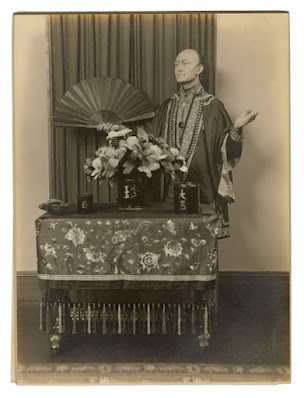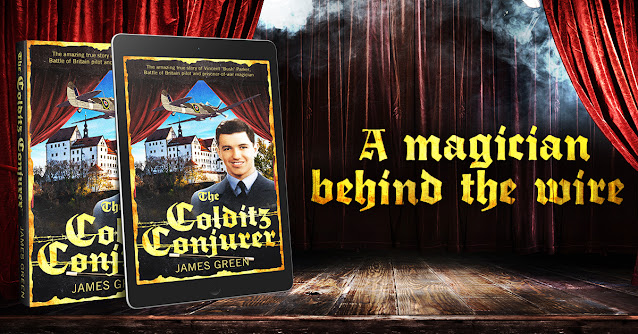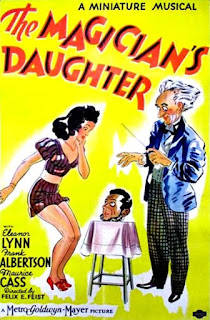Danny Varney: Magic and the Home Front at the Hackney Empire (Part 1)
In this two-part blog, we hear – in his own words – the wartime story of Danny Varney, an amateur magician and a regular audience member at the Hackney Empire, London.
Built in 1901, during the Second Boer War, the Hackney Empire was one of the top music halls of its day. Located in London Borough of Hackney, in northeast London, it provided the people of Hackney with their mass entertainment, taking them through two World Wars, poverty, economic depression and post-war hardships.
A grand venue the Empire has more recently been described by The Guardian newspaper, as “the most beautiful theatre in London.” For over a century, the Empire has seen variety, vaudeville, plays, musicals, films, political rallies, bingo, and more on its stage.
Hackney-resident Danny Varney was a regular audience member at the Empire over the years.
Born in the late 1910s, Varney first started visiting the Hackney Empire as a babe in arms with his mother in the 1920s. Through to World War Two and the immediate post-war years, Varney estimates he must have seen 2,000 acts. These experiences gave him hundreds of hours of entertainment, along with lessons in how to perform himself. As an ’ackneyite, the old Empire was part of his life in other ways too.
Built in 1901, during the Second Boer War, the Hackney Empire was one of the top music halls of its day. Located in London Borough of Hackney, in northeast London, it provided the people of Hackney with their mass entertainment, taking them through two World Wars, poverty, economic depression and post-war hardships.
A grand venue the Empire has more recently been described by The Guardian newspaper, as “the most beautiful theatre in London.” For over a century, the Empire has seen variety, vaudeville, plays, musicals, films, political rallies, bingo, and more on its stage.
Hackney-resident Danny Varney was a regular audience member at the Empire over the years.
Born in the late 1910s, Varney first started visiting the Hackney Empire as a babe in arms with his mother in the 1920s. Through to World War Two and the immediate post-war years, Varney estimates he must have seen 2,000 acts. These experiences gave him hundreds of hours of entertainment, along with lessons in how to perform himself. As an ’ackneyite, the old Empire was part of his life in other ways too.
An evacuee and growing up in wartime Britain
When World War Two started, the government evacuated children from London and other major cities to rural, safer areas. Known as Operation Pied Piper, the evacuation was the biggest and most concentrated mass movement of people in Britain’s history. They evacuated young Danny Varney from Hackney in September 1939. But, he returned a month later when the declaration of war had not led to the expected air attacks on the United Kingdom.
After the Dunkirk evacuation in May/June 1940, as Hitler prepared to invade Great Britain, there was a second round of evacuations. Varney ended up in Somerset, where he was “thrust onto elderly people with Victorian-age concepts of children.” This time, the German airforce subjected London and other cities to The Blitz, an aggressive German bombing campaign designed to pummel the British into submission and force a surrender.
At age 14, Varney left school and started work. He spent some time as a farmer’s boy, before returning to London and working in a shop making shoes for babies. His other early jobs included pulling a baker's cart, and working as an usher, rewind boy and assistant projectionist in a local cinema.
Wanting to do his bit for the war effort, but too young to join the armed forces, Varney signed up to the Air Training Corps, a military youth organisation formed in 1941.
He also volunteered with the Civil Defence Service. This was a civilian organisation which provided volunteer Air Raid Precautions (ARP) wardens, rescue parties, medical services, fire guards, gas decontamination teams, and other such functions. Varney was a Messenger Boy, equipped with a bicycle, and tasked with getting information about a bombing incident back to ARP Headquarters.
Whenever he got a chance, normally weekly, the teenager would go along to the Empire to watch the latest variety show.
Spurred on by his experience of variety theatre, Varney became interested in entertaining:
“I found the easy way in was through conjuring. At age 9, I paid for nine cigarette cards to learn the secret of the four Jacks card trick. I can still do it the way I was first shown, but with a few twists of my own.”
Other simple card tricks followed.
“At age 13... I bought other classics in Woolworth’s for sixpence a time... Eventually, I could do a few tricks at parties.”
Wartime flyer for magic tricks from Woolworth’s Stores
(Source: Author’s collection)
Over time, he developed a basic act and started performing locally. When war came, he performed in air-raid shelters, where scared men, women and children spent hours seeking protection from bombing raids. He also joined a concert party (a group of entertainers) formed from among his Civil Defence colleagues.
Watching magic
Because of his growing interest in conjuring, the magic acts at the Empire held special appeal. Varney wasn't born when Harry Houdini performed there in 1911, but he saw many of the top magicians who appeared in the 1920s, 1930s and 1940s:
“The names of magicians tumble over themselves...
“One... that I always looked out for was... The Great Lyle... Perhaps it was Lyle’s show that made me take up magic, too. At first his show had me as spellbound as the rest of the audience, then as I got a little older and learned a little magic too, they were less mysterious. Then came the realisation The Great Lyle was not a great performer, but had had the money to buy up grand illusions when a real ‘great’ died. Still, he had a big show that went well. A magician in my State says he has some of Lyle’s illusions, but it needs a full stage and several assistants to present them in the grand performer style.
A poster for The Great Lyle featuring his co-performer, Lucille Lafarge
(Source: Potter & Potter Auctions)
“Shek Ben Ali doing his Ali Baba effect with a mass-production of bodies from a row of sealed jars.
“The Great Masoni, an Aussie trapped in England by the war.
“Cingalee with a magnificent close with the Rice Bowls, usually a throwaway item. Lester Sharp.
“Then the magnificent silent act of Douglas Francis with ‘On the Way Home,’ he was a regular at the Empire. Dressed as a very-well lubricated ‘toff’, he stopped under a streetlamp. Then cards, coins, billiard balls appeared from nowhere, and vanishing just as easily. It bewildered him as much as the audience. He ended the act with a cigarette production that changed to a giant cigar and then a pipe. Picking up the streetlamp, he staggered off. He was a mime act because he stammered badly.
“Another magician, in more sophisticated style, in tails did the Multiplying Billiard Balls (I bought my first set at Woolworths in Mare St for sixpence as that 12/13-year-old) ...
“Was it Lyle who got a boy up to help with the Egg Bag, but when the boy put his hands into his own pockets, his trouser-fly (buttons in those days) flew open? The audience roared! The boy, about ten years old, simply smiled, shrugged, and nonchalantly let the magician carry on, got a great round of applause as he trotted down the centre steps. Who was the magi who vanished a large radio set? He wrapped it in newspapers, then with the cord still attached, staggered with it to the front still playing. In a dramatic gesture, he whipped out the plug. The music ceased immediately, then he crumpled up the paper, and the set had vanished. It was marvellous acting and timing!
“Voltaire was not quite a magic-act, but he worked some magic into the act. Trick electric globes... bought in any magic store... were one of the effects. He used stooges too, who when sitting in a chair would leap up as if getting an electric shock whenever he touched them. It had to be fake, would never have been permitted, and the subject could have had a legal claim against him. Bobby was his first name, and he was accepted by the magical fraternity.
“A mystic act came to the Empire, forget his name, but never his material. He worked in a long, flowing robe and had a near bald head. His act was presented paranormal style... A chosen card is torn into pieces, one piece retained, stuck on someone's forehead. The pieces vanish, only to be restored, minus one piece... yes that piece fits microscopically. This mystic did some simple predictions, then his torn-and-restored card. Throwing his head back, in front of a burning brazier, he de-claimed, as the spotlight slowly faded on him, ‘And not for another twenty years will a bloody German army set foot on British soil!’ It brought the house down - it was so dramatic - as we had just got over the threat of invasion.
“Arthur Dowler... [brought] the house down at the Empire. I made up a party of young magicians (20-year-olds) of the Institute of Magicians and we clubbed in and booked the left-hand box to see him. It was an experience. It seemed as if we were on stage ourselves bathed in the lights and all eyes on us.
“The Great Masoni, an Aussie trapped in England by the war.
“Cingalee with a magnificent close with the Rice Bowls, usually a throwaway item. Lester Sharp.
“Then the magnificent silent act of Douglas Francis with ‘On the Way Home,’ he was a regular at the Empire. Dressed as a very-well lubricated ‘toff’, he stopped under a streetlamp. Then cards, coins, billiard balls appeared from nowhere, and vanishing just as easily. It bewildered him as much as the audience. He ended the act with a cigarette production that changed to a giant cigar and then a pipe. Picking up the streetlamp, he staggered off. He was a mime act because he stammered badly.
“Another magician, in more sophisticated style, in tails did the Multiplying Billiard Balls (I bought my first set at Woolworths in Mare St for sixpence as that 12/13-year-old) ...
“Was it Lyle who got a boy up to help with the Egg Bag, but when the boy put his hands into his own pockets, his trouser-fly (buttons in those days) flew open? The audience roared! The boy, about ten years old, simply smiled, shrugged, and nonchalantly let the magician carry on, got a great round of applause as he trotted down the centre steps. Who was the magi who vanished a large radio set? He wrapped it in newspapers, then with the cord still attached, staggered with it to the front still playing. In a dramatic gesture, he whipped out the plug. The music ceased immediately, then he crumpled up the paper, and the set had vanished. It was marvellous acting and timing!
“Voltaire was not quite a magic-act, but he worked some magic into the act. Trick electric globes... bought in any magic store... were one of the effects. He used stooges too, who when sitting in a chair would leap up as if getting an electric shock whenever he touched them. It had to be fake, would never have been permitted, and the subject could have had a legal claim against him. Bobby was his first name, and he was accepted by the magical fraternity.
“A mystic act came to the Empire, forget his name, but never his material. He worked in a long, flowing robe and had a near bald head. His act was presented paranormal style... A chosen card is torn into pieces, one piece retained, stuck on someone's forehead. The pieces vanish, only to be restored, minus one piece... yes that piece fits microscopically. This mystic did some simple predictions, then his torn-and-restored card. Throwing his head back, in front of a burning brazier, he de-claimed, as the spotlight slowly faded on him, ‘And not for another twenty years will a bloody German army set foot on British soil!’ It brought the house down - it was so dramatic - as we had just got over the threat of invasion.
“Arthur Dowler... [brought] the house down at the Empire. I made up a party of young magicians (20-year-olds) of the Institute of Magicians and we clubbed in and booked the left-hand box to see him. It was an experience. It seemed as if we were on stage ourselves bathed in the lights and all eyes on us.
“The mini-illusionists like Col Ling Soo and Sim Sala Bim, who had a 15-minute closing act, were different, while The ‘Great’ Lyle did the full two-hour show.”
Varney saw magicians perform at other venues too, during the war and shortly after. One of these was The Empire at Kingston-on-Thames. In wartime, it was a military convalescent depot, which put on entertainment for injured troops.
“There I saw the mental act of Maurice Fogel, and even though a fairly good magician by this time, wondered whether ‘there was anything in it?’ I know now, of course, there was nothing but conjuring tricks involved.
“Another act there was Lionel King, a card worker, using three genuine assistants from the audience. He would show card sharping. His finale was to let them shuffle the deck and deal out hands for Kitty Nap (Napoleon). The one with the worst hand would win all the tricks, as Lionel called the cards as he walked around the auditorium.”
Varney saw magicians perform at other venues too, during the war and shortly after. One of these was The Empire at Kingston-on-Thames. In wartime, it was a military convalescent depot, which put on entertainment for injured troops.
“There I saw the mental act of Maurice Fogel, and even though a fairly good magician by this time, wondered whether ‘there was anything in it?’ I know now, of course, there was nothing but conjuring tricks involved.
“Another act there was Lionel King, a card worker, using three genuine assistants from the audience. He would show card sharping. His finale was to let them shuffle the deck and deal out hands for Kitty Nap (Napoleon). The one with the worst hand would win all the tricks, as Lionel called the cards as he walked around the auditorium.”
*****
Read Part 2 of this blog to learn about air-raids at the Hackney Empire and Danny Varney’s encounters with Hitler’s V-weapons.
Quoted text is from an article written by Danny Varney in 1991, and revised in 2010. The copyright holder, Danny Varney, has granted permission to use the text in this blog, via Matthew Lloyd. The original, longer article is hosted on Lloyd's excellent website www.arthurlloyd.co.uk, along with further details about the history of the Hackney Empire.
Research supported by The Good Magic Award from The Good Thinking Society
*** AVAILABLE NOW ***
The Colditz Conjurer tells the amazing true story of Flight Lieutenant Vincent ‘Bush’ Parker, Battle of Britain pilot and prisoner-of-war magician.
Written by the Magic at War team, The Colditz Conjurer is a remarkable tale of perseverance, courage and cunning in the face of adversity. It features over 55 original photographs and maps. 126 pages.













Comments
Post a Comment